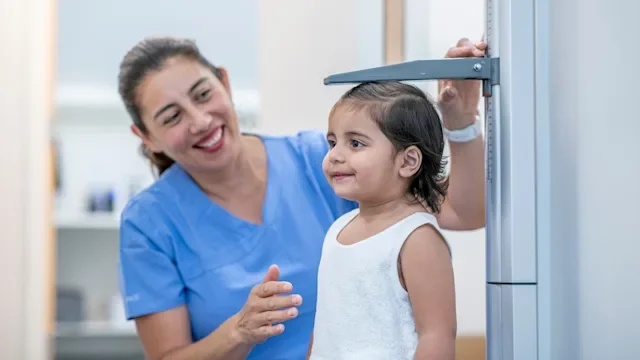Key takeaways:
The start of a new school year can be an exciting time for kids, but it can also be scary. Taking young students to back-to-school and meet-the-teacher events can help ease their anxiety.
Healthy lifestyle habits — like eating well, exercising, and getting good sleep — also contribute to students doing well in school.
For high school and college students in particular, time management is a key strategy for success.
After spending time away from school during summer break, it’s hard for some kids to go back to the classroom. They may wonder if their new teacher will like them or if they’ll make friends. Some might worry about navigating their school campus. These are common concerns for school-age kids as the summer ends.
You can help ease their transition back to the classroom with proven back-to-school strategies. Below you’ll find tips for parents of elementary and middle school students. And if you’re in high school or college, we’ve got tips for you, too.
Tips for helping your child get ready to go back to school
There are many things you can do to get your kiddo prepped for a new school year. Check out these nine back-to-school strategies.
Search and compare options
1. Tour the school
“Parents who attend open house with their child can reduce a lot of first-day jitters,” Melissa Miranda-Smith, EdS, a Georgia-based behavioral specialist with an emphasis in special education, told GoodRx Health. “Your child will get to see who’s in their class, the seating arrangement, and school supply list.”
If your child is new to the school, schedule a tour for them to check out the cafeteria, library, and gym.
2. Meet the teacher or teachers
“Children have less anxiety after meeting their teachers during open house,” Miranda-Smith said. “They feel like they already know somebody before the first day, and they see what they’re getting into.”
3. Create a study area
Kids need a place to do homework and study for tests at home. This space should be in a quiet area of the house and free of distractions.
You can create a study area using:
A corner of a room with a small desk and lamp
One end of the kitchen table
A lap desk in the living room
A portable table and folding chair
Read more like this
Explore these related articles, suggested for readers like you.
4. Build strong study habits
Help your child develop good study habits by:
Using positive reinforcement
Turning off the TV and other electronics during homework time
Supervising their time on the computer and their digital devices
Setting a homework schedule
Giving them breaks if their assignment is longer than usual
Offering help without taking over
Providing school supplies like pens and pencils, paper, dictionaries, and so forth
5. Develop a bedtime routine
Good-quality sleep can help your kid stay focused and concentrate on learning. To get your child on a healthy sleep schedule:
Start getting them to bed earlier, beginning a few days to a week before school starts.
Have them go to bed at the same time every night.
Turn off electronic devices 1 to 2 hours before bedtime.
Engage them in calming activities like reading together or listening to soft music before bed.
Avoid giving them sugary snacks and caffeinated drinks before bed.
It’s important for your child to get enough sleep every night. Experts recommend:
Preschool students ages 3-5: 10-13 hours (including naps)
Elementary students ages 6-12: 9-12 hours
Teenage students 13-18: 8-10 hours
6. Check in with your child’s pediatrician
You want to make sure your child starts school in the best of health. That’s why it’s a good idea to schedule their annual wellness exam over the summer. Your child’s pediatrician can check for changes in your child’s vision, hearing, and blood pressure. And your child can also get caught up on their vaccinations.
During your visit, talk to your child’s provider about any social, emotional, or physical health concerns. If your child plans on playing sports, ask about a sports physical, too.
7. Get transportation in place
Talk with your child about how they’re going to get to and from school:
By bus: Learn your child’s bus number, schedule, and pickup and drop-off locations. Go over safety rules like waiting on the curb where the bus driver can see them and looking both ways before crossing the street. And ask the school if your child can meet their driver before the first day.
By car: If you plan on carpooling, set your schedule with the other drivers. When you’re driving, remind the children to wear their seatbelts. And have a plan B for days when a driver cancels at the last minute.
Biking: Go with your child on their bike route before the first day of school. Make sure they wear a helmet, obey traffic lights and stop signs, and use hand signals when turning or stopping.
Walking: Walk your child’s route with them to make sure it’s safe and doable. Remind them to look both ways before crossing the street and obey traffic signs. And look for other kids they can walk with from your neighborhood.
8. Establish a family routine
Before school starts, get your family into a predictable routine, with set times for meals, regular exercise, and family activities. Kids who know what to expect from their days transition better when they go back to school.
Miranda-Smith suggested making and posting a daily schedule for your child that includes the times they:
Wake up
Leave for school
Get home from school
Go to bed
9. Get books about going back to school
“Getting books about starting school, moving to a new state, or making friends is a good way to reduce anxiety for elementary school students,” Miranda-Smith said. Look for these titles at your local library:
“First Day Jitters” by Julie Danneberg and Judy Love
“The Pigeon Has to Go to School” by Mo Willems
“Our Class Is a Family” by Shannon Olsen and Sandie Sonke
“A Letter From Your Teacher: On the First Day of School” by Shannon Olsen and Sandie Sonke
“The Day You Begin” by Jacqueline Woodson and Rafael López
Back-to-school checklist for parents
Use this checklist to ensure you have all the information you need for the new school year. Before the first day, your should have your child’s:
Daily school schedule
School calendar
List of school supplies
Immunization records
Bus schedule
School contact information
Student portal login information
Teacher contact information
Back-to-school tips for high school and college students
When you’re in high school or college, the start of an academic year can present many challenges. Consider these seven tips to get the new school year off to a great start.
1. Tour the campus
College campuses (and high school campuses) come in all shapes and sizes. A visit before the school year starts is a must if you plan on living or spending your days onsite. It will give you a chance to map out where to park and how to get to your classes. You can also locate other important campus landmarks, like the dining hall, library, and bookstore.
2. Check your class schedule
Before the first day of the semester, check your class schedule to make sure you’re fulfilling the academic requirements and credits you need. Give yourself enough lead time to meet with your academic advisor if there’s a problem. It’s easier to change your schedule before the semester starts than after.
3. Manage your time
High school and college are like juggling acts. Between classes, extracurricular activities, social commitment, and part-time jobs, there’s a lot going on. Here are some tips to help you manage your time:
Create a calendar with your class schedule, assignment deadlines, and test dates.
Set reminders to stay on top of your assignments.
Establish a routine with set study times.
Use checklists and to-do lists to stay organized.
Schedule breaks and engage in campus activities.
4. Maintain a healthy lifestyle
Healthy habits are foundational for living your best life in high school, college, and beyond. To get the most out of the school year:
Try to get exercise every day, which could mean anything from walking with friends to lifting hand weights.
Eat lean proteins, whole grains, fruits, veggies, and healthy fats when possible.
Make sure you’re getting enough water throughout the day and staying hydrated.
Limit your intake of sugar, saturated fats, processed foods, alcohol, and recreational substances.
Get into the habit of going to bed at the same time every night and waking up at the same time every morning.
Manage your stress with a meditation app, yoga, or soft music.
Know where to go if you get sick; most colleges have a health clinic on campus or an urgent care center nearby.
Always use protection if you engage in sexual activities, and get tested regularly for sexually transmitted diseases (STDs) and sexually transmitted infections (STIs).
Stay on top of annual wellness exams and other recommended screenings, such as pap smears.
Get any necessary vaccinations (and review the CDC’s recommended immunization schedule if needed).
5. Seek out academic help if you need it
Class material can challenge even the brightest of students. It’s OK to meet with your teachers or professors if you don’t understand something; they’re there to help you learn the material and earn a passing grade. And you may also be able take advantage of study groups and peer tutors who can meet with you one on one.
If you think your academic struggles could impact your scholarship eligibility, talk to your academic advisor right away. They can help you figure out what to do to remain in good standing.
6. Get mental health support
If college or high school gets to be too much, you may need someone to talk to. As a first step, it’s a good idea to look into whether or not your school has a counseling center. If it does, there may be an in-house mental health professional you can talk to for free for a limited number of sessions. Or the center may be able to refer you to an outside provider who accepts your insurance.
If your school doesn’t have a counseling center, you may want to seek support from a community clinic, a trusted teacher, or a family member or good friend. Whatever’s troubling you, you don’t have to go through it alone.
7. Check out your student portal
Your student portal is your gateway to important announcements and information about the school year. You’ll find everything from notices about cancellations and campus activities to test scores and class deadlines. So take time to get familiar with everything your portal has to offer.
8. Get your financial aid in order
There are many ways to pay for college, including with federal aid, state aid, and scholarships. College is expensive, so take the time to apply for funds. If you need help, talk to your school’s financial aid office. They can help you find scholarships and disperse your funds to pay for classes, meal plans, and living arrangements.
Back-to-school checklist for high school and college students
This back-to-school checklist can get you organized for the start of the school year. As you prepare for the first day, make sure you have your:
List of items you can and can’t bring with you to campus
List of textbooks
Schedule of move-in and move-out dates
Financial aid documents
Student portal login information
Meal plan information
Medical documents and vaccination records
Academic advisor’s contact information
Class schedule
Parking decal
How to deal with the anxieties of going back to school
It’s normal to feel antsy about a new school year. So we’ve put together a list of strategies that can help you ease your way back into the classroom.
Create a support circle
Everyone needs a network of caring people. Identify family members, friends, or other trusted adults that you can talk to about your back-to-school fears. Reach out to them when you’re struggling with something, and let them know you’re available when they need you.
Practice deep breathing
Slow, intentional breathing can calm your mind and body, giving you a break from stress and anxiety. Try some deep breathing exercises to find a sense of calm.
Reframe negative thoughts
Instead of focusing on worst-case scenarios, try putting a more positive spin on things. For example, try not to think, “I’m never going to pass that test.” Instead, reframe the thought as: “It’s OK if I don’t do well on that test; I have strengths in other subjects.”
Journal
Journaling is an effective way to manage stress. It gives you a chance to process anxious thoughts and feel validated. The journaling tips in this article can get you started.
Limit social media use
Social media can have both positive and negative effects on your life. You can use it to find support from people who identify similarly to you and share your interests. And these interactions can be life-affirming.
But spending too much time on social media can increase levels of anxiety and depression. Some research suggests that cutting back to 30 minutes a day or deactivating social platforms for several weeks may lower anxiety and improve mental health and well-being.
Practice self-care
Practicing self-care starts with habits such as eating well, exercising regularly, and getting good-quality sleep. Remember to take breaks from studying to enjoy time with family and friends. And spend time doing things that make you smile, whether that’s watching a funny movie or volunteering at an animal shelter.
Talk to a mental health professional
You might need a little extra support working through your anxiety. Mental health professionals offer different therapies for managing anxiety. And sometimes just a few sessions with a licensed therapist can make a difference.
Start by talking to your school counselor or seeking out your campus’ mental health clinic. If you don’t find someone you connect with, look for a therapist in your community or call 988, the suicide and crisis lifeline.
The bottom line
Starting a new school year can be both fun and frightening. For parents of younger students, taking your child to visit their school and to meet-the-teacher events can help reduce their anxiety. And it’s also a good idea to establish helpful routines that involve consistent bedtimes, nutritious meals, and time to relax.
If you’re a high school or college student, find out in advance who you can turn to for help with academics and mental health issues. Get to know your guidance counselor, academic advisor, and campus mental health clinic to set yourself up for success.

Why trust our experts?



References
988 Suicide & Crisis Lifeline. (n.d.). Homepage.
Annen, K., et al. (n.d.). Teen self-care planning. Wisconsin Department of Public Instruction.
BigFuture. (n.d.). Campus visit checklist.
Centers for Disease Control and Prevention. (2022). Are you getting enough sleep?
Centers for Disease Control and Prevention. (2023). Helping young children and parents transition back to school.
Centers for Disease Control and Prevention. (2023). Recommended adult immunization schedule for ages 19 years or older.
Federal Student Aid. (n.d.). Types of aid and eligibility. U.S. Department of Education.
Head Start Early Childhood Learning and Knowledge Center. (2023). Sleep and your child: How you can build healthy sleep routines.
HealthyChildren.org. (2019). Back to school, back to the doctor.
MrsHillpartyof6. (2020). Read aloud: First day jitters by Julie Danneberg #firstdayjitters [video]. YouTube.
Ms. Michelle’s Storytime. (2021). A letter from your teacher on the first day of school [video]. YouTube.
Ms. Michelle’s Storytime. (2021). Our class is a family [video]. YouTube.
National Society of High School Scholars. (2018). 7 tips for staying healthy in college.
Nelson, V. (n.d.). Understanding your college student’s class schedule. College Parent Central.
Niles, A. N., et al. (2013). Effects of expressive writing on psychological and physical health: The moderating role of emotional expressivity. Anxiety, Stress, and Coping.
StoryTime Out Loud. (2021). The day you begin - An animated read aloud [video]. YouTube.
ThedaCare. (2019). Five ways teens can cope with school stressors.
The Jed Foundation. (n.d.). Create a plan to take care of your mental health.
The Joyful Bookshelf. (2019). The pigeon has to go to school | Read aloud for kids! | Back to school [video]. YouTube.
The League of American Bicyclists. (n.d.). Signaling and scanning [video].
U.S. Department of Health and Human Services. (2023). Social media and youth mental health: The U.S. Surgeon General’s advisory.
Waterford.org. (2020). How to create an at-home learning space for your child.
















